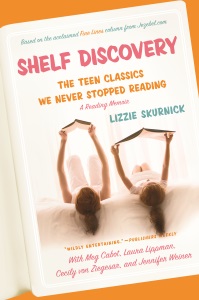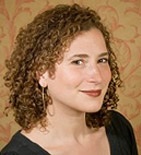 Lizzie Skurnick’s blog-to-book success came from her regular Jezebel.com feature column, Fine Lines. This blog consists of her meditations on favorite, old-school YA (young adult) novels from the late ‘60s to the early ‘80s—books much beloved by now-grown-up women.
Lizzie Skurnick’s blog-to-book success came from her regular Jezebel.com feature column, Fine Lines. This blog consists of her meditations on favorite, old-school YA (young adult) novels from the late ‘60s to the early ‘80s—books much beloved by now-grown-up women.
Skurnick says, “The book resembles the blog, but I added twice as many columns and organized and edited them into schools of thought for the reader.”
It was published by Avon in July 2009.
Why did you begin blogging?
I began blogging in 2003, just when literary blogs were coming into existence. I was working as a freelance cultural journalist, but I saw that other people were having the literary conversations online that I didn’t have a space to publish in print, and I wanted to join in.
How did you choose your topic?
Blogging with a purpose in mind is less rewarding then blogging out of enthusiasm. It’s one of the few media that thrives on your individual obsessions and your true writing voice, in which you can wax on about arcane bits of knowledge that would never have a go in print. So I was free to venture off into discourses on Roald Dahl’s adult stories; poems based on current book deals; posts in which I asked my audience to find a word to describe a typical writers’ complaint. (Our winner for the annoyance of seeing an enemy publish a book: “Penvy.”)
Since I didn’t have to prove to an editor their audience would enjoy my work, I was free to develop my own audience, who also had their own esoterica they pursued and I loved to see.
What, if any, market research did you do before beginning your blog?
I didn’t need to do any market research. I knew quite well that my group of friends and the larger group of bookhounds my age had read all the books from the ‘70s and ‘80s for girls and loved and valued them but that nobody had ever taken the time to write about them en masse before. I think market research violates the essential tenet of blogging, which is that your enthusiasm, creativity and fine work will find an audience if they deserve one. It’s a place for purists and enthusiasts, not opportunists.
That said, when my blog did become a book, I was often frustrated by how my publisher marketed it. They did very little to learn about the large audience I already had and wanted to sell it to their own audience, who’d never expressed an interest. It was lazy of them, and it wasn’t until a second publicity team came on that loved and understood the book that the publisher really joined forces with me in linking the web lovers into print.
Did you think you were writing a book, did you plan on blogging a book, or were you simply blogging on your topic? (In retrospect, would doing one or the other have made it easier to later write your book?)
I was simply blogging on the topic, but when I began I was fairly sure a publisher would want it. (After all, it’s a book about books.) It also had an enthusiastic audience, and it had never been done before. In fact the publisher pursued me; I never sent out a proposal prior to that, and I already had an agent who’d followed me since the early days of my blog who I asked to represent me on the deal.
How long did it take for you to gain blog readers, and can you pinpoint any certain event that created a tipping point when readership increased noticeably?
I’d always had a devoted, good-sized readership, but I really lucked out to have my column featured on Jezebel.com, a new blog for women my age. They had an enormous readership already so I was free to develop my own fans there.
I would have been able to work up interest in the column on my own, but it would have taken much, much longer, and been much more work on my part. Also I had a wonderful editor at Jezebel.com who believed in the project and supported the feature wholeheartedly, which is priceless to a writer.
What did you do to drive traffic (readers) to your blog?
I didn’t do anything! I wrote about what I enjoyed, and I had conversations online with other bloggers who were also writing about things I was interested in.
How did your blog-to-book deal come about?
A few editors at HarperCollins contacted me, I contacted the agent I knew from the old days, I wrote a proposal, and we inked the deal.
What one or two things that you did would you attribute to your blogging success (and to the book deal you landed)?
One thing bloggers should do is be consistent, which is why blogging on something you’re enthusiastic about is important. You don’t get a book deal from a concept—you already have a concept, something you’ve been wanting to shape into a larger project for years. If you’re passionate about something, it’s easy to find others who’ll share your passion, especially if you’re also a clever, funny writer, or if you’re doing important, original work. So I would discourage people from trying to shape their ideas before they’ve even blogged. If it’s not something you’re compelled to do already, it’s probably not anything you could take far enough into a large blog project and then a book.
What advice would you give to writers wanting to blog a book (and build readership/platform while doing so)?
Choose a project you love, something you’ve always wanted to do. And if it doesn’t take, don’t feel too bad. Maybe you’re not a blogger. It’s not like blog-to-book deals are the only way to express your enthusiasms to a larger audience.
What’s the most important thing a blogger can do to get noticed in the blogosphere?
It’s less important to be noticed than it is for your project to have integrity and consistency and, one hopes, a degree of fun or novelty. Notice will follow. You can’t start by trying to be noticed. Blogging is like a dinner party. Being successfully social isn’t about trying to get attention at any cost; it’s about being yourself and appreciating others.
About the Author
 Lizzie Skurnick is the columnist for Jezebel.com’s Fine Lines and the author of ten teen books in the Sweet Valley High, Love Stories and Alias series. Her literary blog, Old Hag, is a Forbes Best of the Web pick. She’s on the board of the National Book Critics Circle and has written on books and culture extensively for the New York Times Book Review, Times Sunday Styles, the LA Times, NPR.org, The Washington Post and many other publications. Her poetry has appeared everywhere from Morning Edition to the Iowa Review to New York magazine online, and she is the recipient of residencies or awards from Yaddo, the Ucross Foundation, the Virginia Center for the Creative Arts, and the AWP. An expanded edition of her Pushcart Prize-nominated chapbook of poetry, Check-In, was released by Caketrain Books in 2009. She lives in Jersey City.
Lizzie Skurnick is the columnist for Jezebel.com’s Fine Lines and the author of ten teen books in the Sweet Valley High, Love Stories and Alias series. Her literary blog, Old Hag, is a Forbes Best of the Web pick. She’s on the board of the National Book Critics Circle and has written on books and culture extensively for the New York Times Book Review, Times Sunday Styles, the LA Times, NPR.org, The Washington Post and many other publications. Her poetry has appeared everywhere from Morning Edition to the Iowa Review to New York magazine online, and she is the recipient of residencies or awards from Yaddo, the Ucross Foundation, the Virginia Center for the Creative Arts, and the AWP. An expanded edition of her Pushcart Prize-nominated chapbook of poetry, Check-In, was released by Caketrain Books in 2009. She lives in Jersey City.

The more people realise that it is important to pass on knowledge and experience by using a book as a transport medium the better it is although we are living in a digital world.
Marijke